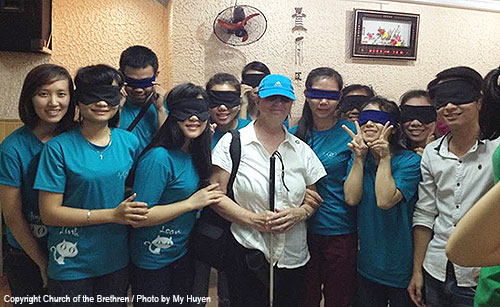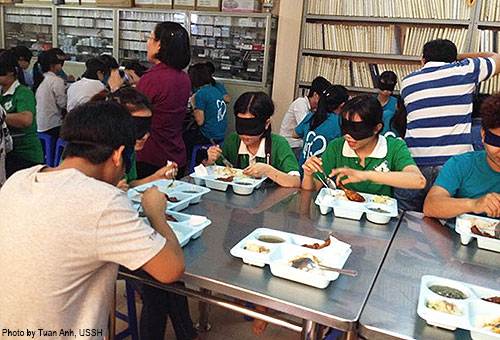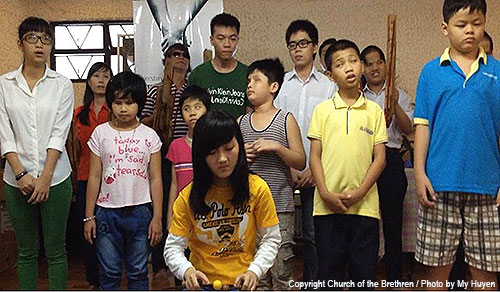
By Nguyen Thi My Huyen
On Nov. 18, 2015, Thien An Blind School of Ho Chi Minn City, Vietnam, hosted a one-day training for 30 sociology students as a part of Service Learning at the University of Humanities and Social Sciences. Participating in this training day were Grace Mishler, a Church of the Brethren member who serves in Vietnam with Global Mission and Service; her program assistant Nguyen Xuan; and program trainee Nguyen Thi My Huyen.
Through this workshop training, students gained knowledge about blindness. The dean of the Department of Sociology supports Service Learning to educate students in how to approach marginalized persons in the society. Mishler provided the network link to make this Service Learning happen. The LIN Center of Ho Chi Minh City provided support money to Thien An School in the effort of raising the social awareness of students with visual disabilities. The instruction followed the Hadley School for the Blind in the USA.
The headmaster of the school was the primary trainer and instructor. He is blind and had a powerful way of transforming blindness into a spiritual connection between the training group and Thien An Blind students. He gave a wonderful, meaningful, practical presentation.
The headmaster taught seven steps in adapting to losing vision, the causes of losing vision, and how to communicate with blind people. He shared some examples of perceptions, cultural beliefs, and misunderstandings about blindness, which made many students realize how much they did not know before attending this training.

Sociology students learn to eat lunch without sight, at a training at a school for the blind in Vietnam.
The participants also were required to write a two-page, self-reflective journal for their sociology class. Below are some reflections from students, about what they felt after the training. Overall, it was a fantastic experience for them.
For many students, having lunch in the dark was the most interesting part of the training day. The dishes were put on the trays according to the structure of 12-3-6-9 positions on a clock. The participants were instructed about the locations of the food, so that they knew how to visualize it. “It was the most unforgettable meal ever in my life,” reflected Thi Huyen (Class K18 – USSH). “I couldn’t eat all of the food in my tray because it was so hard to eat without knowing where the food was located, even though we were instructed before the meal.”
Another student reflected, “The room seemed to be ten times bigger because it was just too dark. I found fear in each step I made. And when somebody held my hand and led me to the dining room, I felt so safe and extremely happy” (Hoang Minh Tri of Class K18 – USSH).
“I was scared,” wrote another. ‘It was simply scared of falling, scared of getting hurt. But I always knew that I still can see again after this training. My fear was not even comparable to the fear of blind people knowing the loss of their body parts and they will live their whole life without light. But looking at what blind people do, we all know that they can live their lives as normal as sighted people do and accomplish great things. I really admire the strength of those people” (Bui Thi Thu of Class K18 – USSH).
Braille Training and Practice: Six Magic Dots

Thien An Blind School students sing a welcoming song for the visiting class of university students. Thien An’s welcoming song included these words: “In our own home, the sadness disappeared. In our home, happiness is doubled. Because we cry, we laugh with all of our hearts. We share love and our own lives. Thien An–our own home forever…”
The students were introduced to the Braille system, from basics to details. Then they played a game of translating poems from Braille to Vietnamese, and the opposite. Because Braille is not easy for beginners, they translated the poems to different meanings, which allowed them to have so much fun with the game.
“The game has brought valuable lessons for students on how to use the Braille system and feel the initial difficulties of the visually impaired students,” said a quote from a reflection book report from the Pandora group of Class K18 – USSH.
“After the training day, I have learned a lot for myself about blindness, and it changed the way I see people with physical difficulties,” reflected Minh Tri of Class K18 – USSH. “They are born with blindness, not that they are blinded, and we are all equal as human being. I see myself as a lucky one to be born as an able-bodied person. [That] does not mean that blind people are unlucky. I feel the necessity to be more responsible to my own self and society.”
— Nguyen Thi My Huyen is a trainee serving with Grace Mishler and the Global Mission and Service project in Vietnam, which works with people living with disabilities. Mi Huyen recently spent a year in a Service Learning experience with Elizabethtown (Pa.) College, under the leadership of Dr. Peg McFarland and college’s School of Social Work.